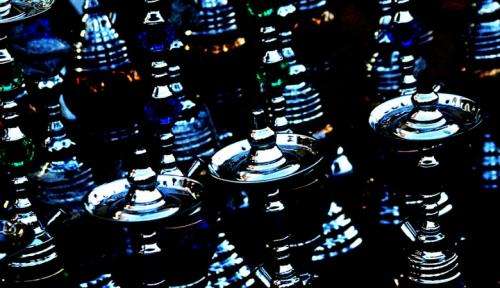Herbal shisha a potential health hazard, study says

(Medical Xpress)—Just because something is marketed as herbal doesn't make it healthy—especially when it comes to smoking shisha, which can contain toxic metals, tar and other carcinogenic compounds sometimes on par with cigarettes, warn researchers from the University of Alberta.
In a new study published this month in the peer-reviewed journal Tobacco Control, an international team of researchers led by the U of A studied three popular Canadian brands of herbal shisha and found trace toxic metals such as chromium, nickel and arsenic, in addition to high levels of tar in smoke inhaled from shisha hookahs, or water pipes.
Herbal shisha also contained carcinogenic compounds such as chrysene, found in coal tar, and naphthalene, used in mothballs, in levels matching or exceeding what's found in cigarettes. None of the three brands identified ingredients or had content warnings—a level of oversight not required in Alberta.
"It's a misuse of the word herbal, which has a connotation of health," said Barry Finegan, lead author and a professor of anesthesiology and pain medicine in the Faculty of Medicine & Dentistry. "Unlike a bottle of pop, which contains a list of ingredients, you can buy a package of shisha material commercially and have no idea what's actually in it. A consumer cannot assess carefully what's in the package and whether there's a potential health risk; there's no consistency to it."
Research helps inform policy
The research has already helped inform public policy, with the Government of Alberta's announcement of tougher new anti-smoking legislation. Finegan and co-authors Fadi Hammal and Warren Kindzierski were on hand Nov. 7 when the province announced Bill 33, the Tobacco Reduction Amendment Act, which would prohibit smoking in a vehicle in which minors are present and ban the use of tobacco-like products such as water pipes in public places. The government also announced its support for private member's Bill 206, which would ban flavoured tobacco.
Finegan said his interest in exploring herbal shisha was sparked by Hammal, his research associate, lead author of the study and a master's candidate in the School of Public Health. A native of Syria, Hammal said that when he arrived in Edmonton he was surprised at the popularity of herbal shisha, which is often sold in fruity flavours that appeal to those who would never consider smoking a cigarette.
"Given smoke-free legislation in Alberta, I was surprised to see that kind of exemption for herbal shisha," said Hammal, noting shisha smoking is not allowed in enclosed places in Syria and Lebanon, and some cities in the Middle East have bans in place. "The awareness of the potential dangers just isn't at the same level here in Canada."
Air quality like being downwind of a forest fire
Colleagues from the University of Beirut analyzed herbal shisha smoke and found that when inhaled it contains up to three times more tar than tobacco shisha, along with polyaromatic hydrocarbons (PAH), a known carcinogen. Second-hand smoke from herbal shisha contains formaldehyde and PAH compounds equal to or in excess of what's found in second-hand tobacco smoke.
Researchers also analyzed air quality at six Edmonton hookah bars where herbal shisha is smoked and found microparticle contents equivalent to what can be found in Beijing during the winter or downwind from a forest fire. One of the bars also contained nicotine vapour, indicating that tobacco shisha was also being smoked.
"The notion that a water pipe is smokeless is completely untrue. If it were, the air quality in these cafes would have none of the harmful constituents—but they do," said Kindzierski, an air quality expert and associate professor in the School of Public Health.
Finegan and the research team hope their work, which represents a comprehensive analysis of the potential dangers of shisha, serves as a wake-up for the public—especially those young smokers of the water pipe who turn to herbal products believing them to be safer than cigarettes.
"A water pipe is often not thought of as smoking, that by bubbling it through water you're removing the impurities, but we've shown that's not the case with hookahs smoked in this city," he said. "We are saying it is smoking and it is potentially dangerous."
















